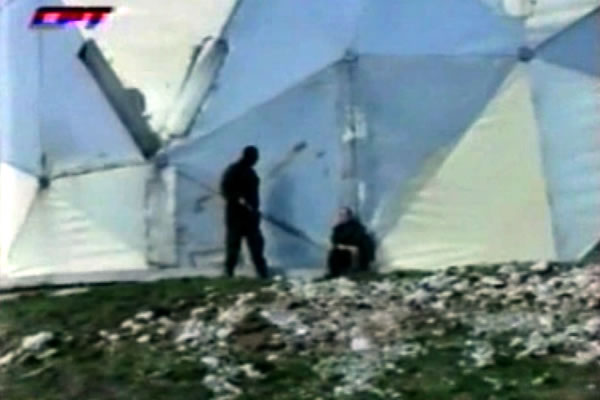Home
PROSECUTION BEGINS CALLING EVIDENCE ON UN HOSTAGES
The prosecution has today begun calling evidence on the incidents in which more than 200 UN staff were taken hostage, the fourth and final joint criminal enterprise Ratko Mladic is charged with. The first to give evidence is a French officer who was disarmed at a UN check point on Vrbanja Bridge in Sarajevo in May 1995 together with nine other ‘blue helmets’
 One of the UN hostags in Mey and Juni 1995
One of the UN hostags in Mey and Juni 1995 At Ratko Mladic’s trial, the prosecution has begun calling evidence on Count 11 in the indictment charging the former commander of the VRS Main Staff with involvement in yet another joint criminal enterprise. As the indictment alleges, Mladic, ‘in concert with other [members of the joint criminal enterprise] planned, instigated, ordered and/or aided and abetted’ an action in which more than 200 UN military observers and peacekeepers were taken hostage by the Bosnian Serbs. The aim of the enterprise was to prevent further NATO air strikes against Bosnian Serb military targets following the strikes of 25 and 26 May 1995. The first of the witnesses slated to give evidence in the final stage of the prosecution case was a French officer whose identity was protected: he testified under the pseudonym RM 401.
According to the summary of the statement given to the French judicial organs in Paris in March 1998, the witness and nine other ‘blue helmets’ from his unit were disarmed at a check point on the Vrbanja Bridge on 27 May 1995. They were then taken to different locations under the Serb control including the VRS military barracks in Lukavica. Over at least two days, the ‘blue helmets’ were beaten, tied to each other and threatened with death. At one point, the witness heard a message the VRS sent to UNPROFOR: if UNPROFOR rejected the demands made by the Serb side, the witness and other UN members would be executed. The hostages were released on 13 June 1995.
The witness provided more details about how they were disarmed and treated in captivity in the cross-examination by Mladic’s lawyer Dragan Ivetic. Serb soldiers took the UN check point without a single shot fired in a ‘sudden, very brutal nighttime operation’, carried out commando-style. The Serb soldiers wearing UN uniforms showed up suddenly at the checkpoint at about 4 a.m. They overpowered two guards and then captured all the ‘blue helmets’ who were there. As the witness explained, he decided that his soldiers should not open fire to avoid ‘slaughter on both sides’.
Defense counsel Ivetic quoted from a UN French Battalion document, which states that the ‘blue helmets’ at the Vrbanja Bridge were captured by ‘fanatics’ that is Chetniks under the command of Slavko Aleksic Vojvoda, and not by the ‘regular Serb forces’. The witness said that most of the men in the group that captured him were indeed members of Aleksic’s group, but insisted that there were also regular soldiers. After the arrest, he and other UN members were taken to the military barracks in Lukavica by soldiers wearing VRS uniforms. There, the provisions of the Geneva conventions pertaining to the rights of the prisoners of war were read out to them, the witness confirmed, much to his surprise. The witness thought it ‘paradoxical’ that he and his soldiers should find themselves in a situation where they were treated as detainees or hostages, in the first place.
As the witness recounted, two UN members were taken to a military facility in the Serb-controlled area on 29 and 30 May 1995. There the UN members were handcuffed to the building as human shields to protect it against NATO air strikes. As he answered the defense counsel, the French officer said that he and his men were treated well while they were in Lukavica. Prosecutor Lee asked the witness if he believed that being handcuffed to a military facility constituted good treatment. It was ‘unacceptable’, the witness replied, but it was better than what happened to them immediately after their arrest on 27 May 1995. When the witness spoke about the worse treatment, the court went into closed session.
Ratko Mladic is charged with participating in four separate but interrelated joint criminal enterprises: ethnic cleaning of large parts of BH, the terror campaign in Sarajevo, the genocide in Srebrenica and taking UN staff hostage.
Linked Reports
- Case : Mladic
- 2013-10-21 MLADIC’S CURSING IN COURT
- 2013-10-18 ‘AN OCEAN OF TRAUMA, DESPERATION, SOLITUDE AND FEAR’
- 2013-10-17 SARAJEVO: NO PLACE WAS SAFE
- 2013-10-23 WITNESS ILL, MLADIC’S TRIAL ADJOURNED
- 2013-10-25 ‘HOSTAGE OPERATION’ RUN BY TOP VRS ECHELON
- 2013-10-28 EVIDENCE FROM ORAHOVAC MASS GRAVES
